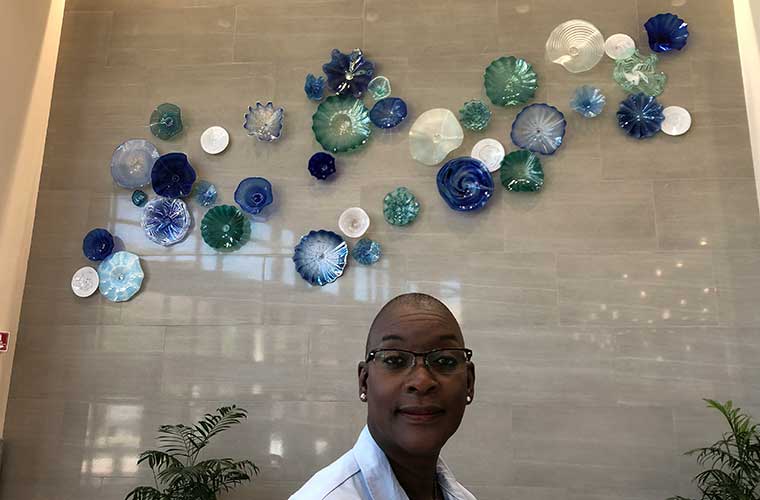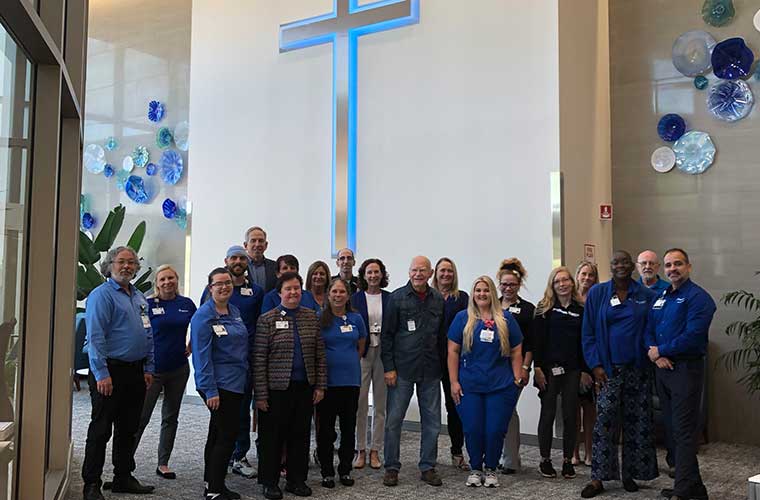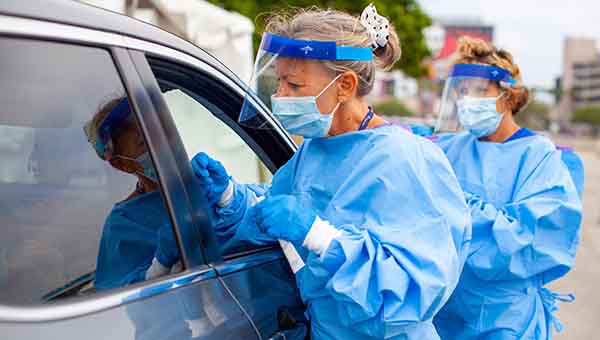Shining Light on Colorectal Cancer

Each year St. Anthony’s Hospital team members gather the first Friday in March for the Dress in Blue Day photo, a way to mark Colorectal Cancer Awareness Month.
Linda Pondexter-Gidron, St. Anthony’s volunteer resources manager, always shows up for the picture dressed in whatever shade of blue she wants to wear that day. She has a personal reason for participating year after year. Pondexter-Gidron is an 11-year survivor of colon cancer.
Pondexter-Gidron is known for her Monroe’s Mercy Packages program in which she uses her talent for couponing to buy household items to give to those in need. She often donates the packages to those who are just starting in new Habitat for Humanity homes. She is active in her church. And she can often be seen helping in a variety of activities around the hospital.
Now she wants to tell her story to help those who may not know much about colon cancer.
“It’s so important to me that everyone knows more about colon cancer,” said Pondexter-Gidron, a team member for BayCare and St. Anthony’s for 16 years. “I’m a proud survivor and I like to spread the word.”
The American Cancer Society estimates that colorectal cancer will kill more than 52,500 people in the United States this year. Excluding some types of skin cancer, the ACS says that colorectal cancer is the third most common cancer diagnosed in men and women in the United States. And the organization estimates that nearly 107,000 new cases of colon cancer will be diagnosed, while a little over 46,000 new cases of rectal cancer will be diagnosed this year.
Colorectal cancer also disproportionately affects the Black community, according to the American Cancer Society, where the rates are the highest of any racial/ethnic group in the United States. African Americans are about 20% more likely to get colorectal cancer and about 40% more likely to die from it than most other groups, the organization says.
If there is a silver lining in these numbers it’s this: If detected early, colorectal cancer is highly treatable. “Finding out what is causing any concerns with your health is absolutely key to providing the best outcome,” said Abhitabh Patil, MD, a gastroenterologist who is co-medical director of the St. Anthony’s Hospital Heartburn and Swallowing Center. “So many patients feel that something isn’t right. Like Pondexter-Gidron, patients should work with their primary care physicians to get the right tests that should lead to the right diagnosis.”
Colon cancer wasn’t initially on her mind. Pondexter-Gidron said she was more attuned to breast cancer. “My family has a history of breast cancer and I was concentrating on getting yearly breast exams and learning more about it,” she said. There was no history of colon cancer in her family.
Pondexter-Gidron said she felt that her health was fairly normal. However, she did have occasional abdominal bloating after eating just a few chips or drinking a glass of water. Her primary care physician said that she should have several tests including a colonoscopy.
It was her good relationship with her primary care physician that helped her get from diagnosis to surgery and then on to recovery. “Having a good relationship with your doctor is very important. Your doctor and you are your biggest advocates in helping to solve your health issues,” she said. “Having a consistent dialogue with your doctor about any issues you are experiencing helps keep your health concerns at the top of the list when you are visiting your physician.”
On Feb. 14, 2012, her doctor called her with the news. She had stage 2 colon cancer. “I was in total disbelief and shock,” she said. “My physician was proactive and had called a surgeon prior to calling me. When he gave me my results, he asked if I could be at the surgeon’s office later that day.
Pondexter-Gidron went to the appointment with the surgeon, and after discussing her options she asked a crucial question: “When can we have this done?” Surgery was scheduled for Feb. 28 at St. Anthony’s. After nine days, she was released from the hospital. No further treatment was needed.
“When your doctor asks, ‘What’s the purpose of your visit?’ be honest,” she said. “There may be other tests that can help determine and/or solve some of the health issues you are having. My doctor listened to my concerns and heard my cry. He had me do several other tests, but the last colonoscopy determined that I had colon cancer.”
Now, Pondexter-Gidron has a colonoscopy every three years. “I think sometimes people fear the colonoscopy,” she said. “For me, the most difficult part of the colonoscopy is prepping the day before. The colonoscopy is a quick process unless doctors find something major when performing the colonoscopy.”
Talk to your physician about your concerns, she said. “Having that good relationship with your doctor can help to determine if there are other test or treatment options,” she said.
Pondexter-Gidron says she definitely wants to help more people know about this highly treatable disease. “Information about colorectal cancer is out there, but I don’t think it’s as visible as other diseases like breast cancer and heart disease,” she said. “I think the more we talk about it, then more of the stigma can be removed from it.”
And she’ll continue to Dress in Blue each March to highlight colorectal cancer. “Like I said, I’m a proud survivor.”
For more information on the variety of colon and rectum cancer services BayCare offers, visit BayCareCancer.org.



